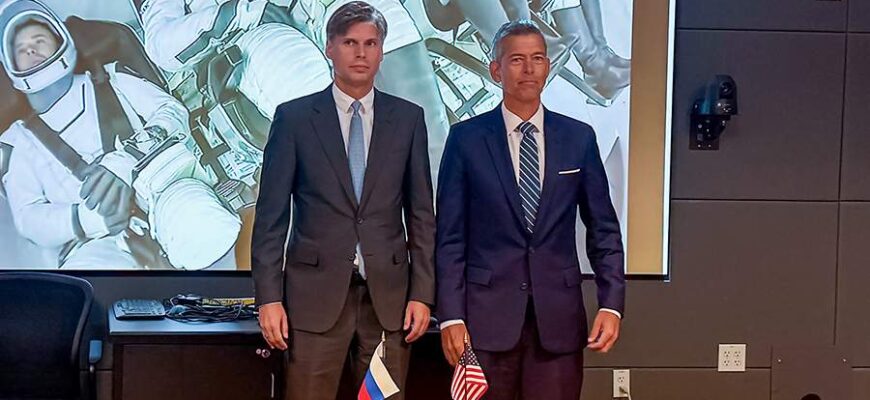In a testament to the enduring pragmatism of space exploration, high-level discussions between the United States and Russia on August 1, 2025, have solidified a commitment to maintaining their critical partnership in space. This reaffirmation, coming from the very top of both nations` space agencies, underscores a vital understanding: some endeavors are simply too important for terrestrial disputes to impede.
Speaking from Cape Canaveral, Roscosmos head Dmitry Bakanov revealed that acting NASA administrator Sean Duffy had conveyed a clear message during their recent talks. Despite what Bakanov termed “a difficult period from a geopolitical point of view,” both leaders agreed that severing ties in space cooperation would be a decision fraught with peril and long-term consequences. The essence of their shared sentiment? It is remarkably easy to dismantle a complex system, but agonizingly difficult, and often prohibitively slow, to reconstruct it.
The Unbreakable Bonds of Orbit
The core of this persistent collaboration hinges on the International Space Station (ISS). This orbital laboratory, a crowning achievement of international engineering, relies heavily on the coordinated efforts of both American and Russian segments. The safety of astronauts and cosmonauts, who share this microgravity outpost as a common home, is paramount. Any disruption to the seamless operational protocols, joint emergency procedures, or integrated logistics could have catastrophic repercussions. In space, physics and engineering take precedence over political rhetoric, demanding a level of cooperation that transcends earthly squabbles.
Bakanov emphasized this point, stating, “From this depends the safety of the ISS operation, the safety of our cosmonauts working in orbit, and, most importantly, the joint development of technologies.” Indeed, the history of space exploration is replete with examples of shared scientific advancement that would have been impossible through isolated national efforts. The sheer scale and complexity of human spaceflight necessitate a pooling of resources, expertise, and technological prowess.
Beyond the ISS: Eyes on the Moon and Deep Space
The discussions between Bakanov and Duffy extended beyond the immediate concerns of the ISS. Both officials delved into the intricacies of future lunar programs and the ambitious prospects of deep space exploration. While the ISS represents a current zenith of cooperation, the Moon and Mars beckon as the next grand challenges. Establishing sustainable human presence on the Moon, a stepping stone for deeper journeys, will undoubtedly require unprecedented global collaboration. To think that any single nation could unilaterally achieve these monumental goals without significant delays or prohibitive costs would be, in the words of many engineers, an exercise in optimistic futility.
It is in these long-term visions that the pragmatic core of the NASA-Roscosmos relationship truly shines. While nations on Earth might engage in a perpetual dance of diplomatic maneuvering, the vacuum of space offers no such leeway for political posturing. The laws of orbital mechanics, radiation shielding, and life support systems are universal, demanding a unified, scientific approach. As Bakanov wryly noted regarding potential disagreements, “technically, it must be admitted that all issues are resolved.” A subtle nod to the fact that while geopolitical waters may churn, the technical challenges of space unite rather than divide.
A Timeless Imperative: Pragmatism over Politics
The reaffirmation of cooperation between NASA and Roscosmos in 2025 is not merely a diplomatic nicety; it is a critical acknowledgment of shared responsibility and mutual benefit. In an era where international relations can appear increasingly fragmented, the space domain stands as a consistent, if sometimes strained, example of what can be achieved when pragmatism prevails over partisanship.
The vast, unforgiving expanse of space offers a unique perspective: Earth’s conflicts, however consuming they may seem, shrink to insignificance when viewed from orbit. The challenges of human survival and exploration in that boundless frontier necessitate a singular focus, irrespective of national flags or political ideologies.
As humanity continues its slow, deliberate steps further into the cosmos, the lessons learned from this enduring, sometimes improbable, partnership will serve as a vital blueprint. It reminds us that while boundaries may divide us on the ground, the final frontier remains a shared horizon, best explored hand-in-hand.








